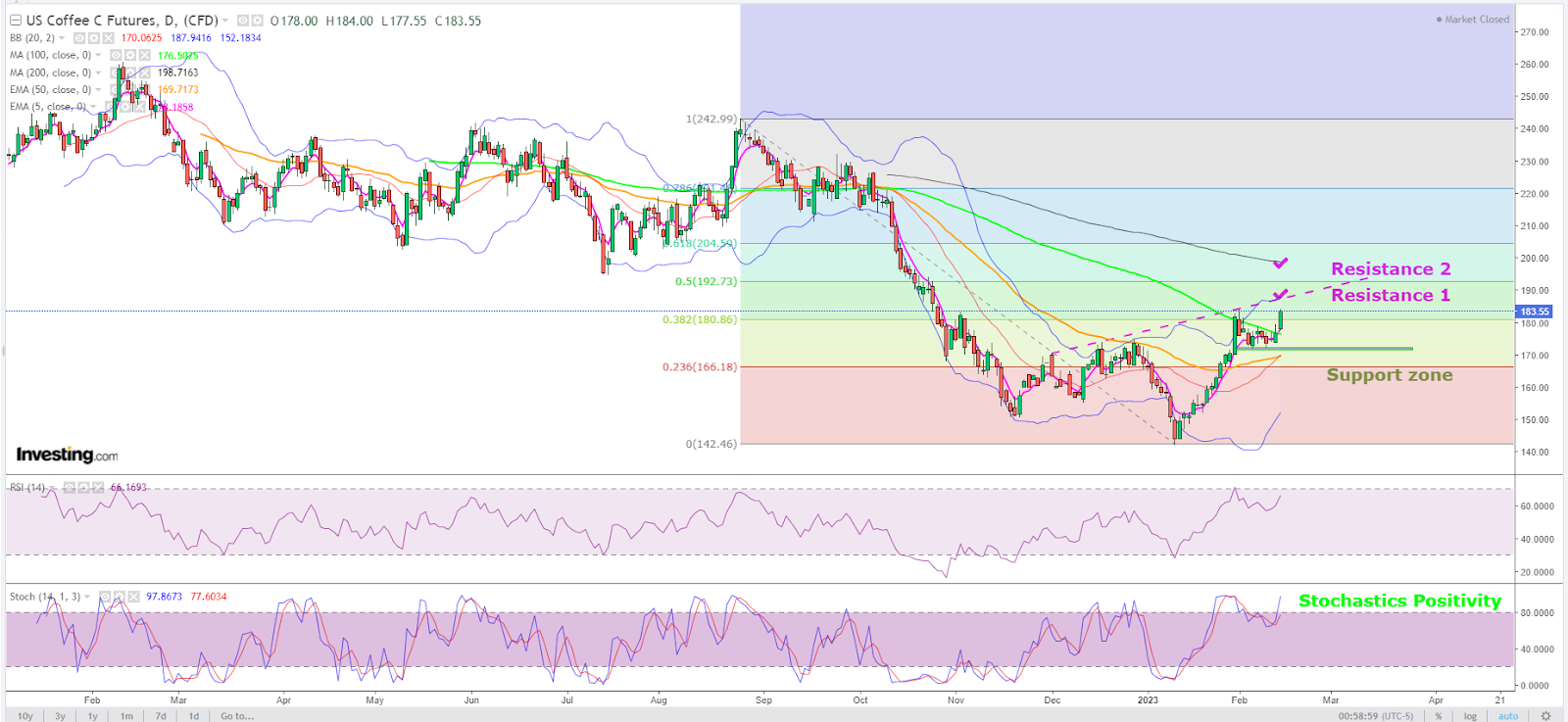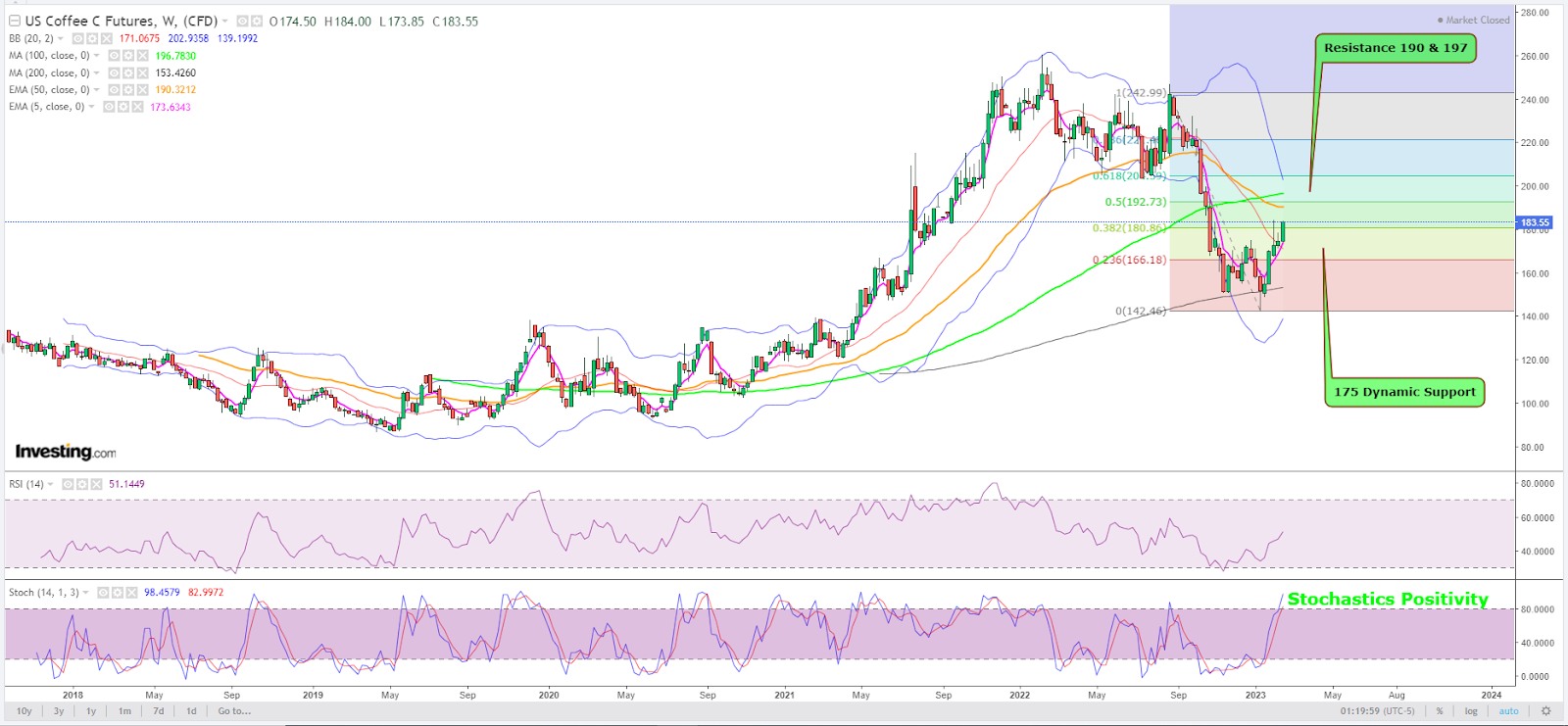- Premium coffee bean arabica up 20% over five weeks, going from $1.52/lb to $1.84
- Rally comes as near-term weather in Brazil plays mind games with trade
- Notwithstanding the short-term outlook, a Reuters poll has coffee ending the year down
- Prior to that, current momentum could lift arabica to $1.98
Coffee aficionados sitting in a Starbucks (NASDAQ:SBUX) or one of those fancy shops selling $6 lattes often vent about why they pay that much when, the last time they checked, the price of arabica was going down.
Well, check again.
New York-traded arabica on the InterContinental Exchange has risen 20% over the past five weeks, going from $1.5170 per lb at the end of the Jan. 6 week to $1.8355 at the end of Feb. 10. The rally began after arabica hit a 20-month low of $1.42.
The surge comes even as a Reuters poll of 10 commodities traders and analysts forecast that arabica coffee is forecast to post an annual drop of 12% in 2023 as top producer Brazil is expected to flood the market with a surplus of beans for the 2023/24 season.
Prices are seen ending 2023 at $1.48 per lb, down 15% from last Friday's close and 12% lower than levels seen at the end of 2022, according to the poll's median forecast.
Charts by SKCharting.com, with data powered by Investing.com
Poll participants said the size of Brazil’s 2023/34 production would play a key role in determining prices, with some uncertainty about whether the huge crop that had initially been expected will actually be harvested. Brazil’s coffee crop in 2023/24 was forecast to climb to 67.1 million 60 kg bags, up from a median estimate of 61.5 million bags for the 2022/23 crop.
The median forecast was, however, below the consensus of 71 million bags in a Reuters poll issued in July 2022, with the crop not developing as well as expected, possibly because the trees were not healthy enough after a very dry winter in Brazil.
Poll participants also cited the potential for curtailed demand - due to high retail prices and a global economic downturn - as a factor in the bearish outlook for prices.
Coffee analysts tracked by Investing.com did not exactly dispute the findings of the Reuters poll. Over the longer term, as Brazil’s full yield and harvest for the season comes in, that’s the prognosis — that prices will fall by the year-end, they said.
But in the near term, shifting weather patterns in Brazil were playing mind games with the trade, they added.
Said Jack Scoville, Chief Crop Analyst at Chicago’s PRICE Futures Group:
“Ideas of a big production for Brazil continue due primarily to rains falling in Coffee production areas now.
But there are also ideas that the production potential for Brazil has been overrated. The weather in Brazil is currently very good for production, but worse conditions seen earlier in the growing cycle have hurt the overall production prospects, as did bad weather last year.”
Prior to the rally that began in January, investors in arabica spent four months in the red, accumulating a loss of 30%.
Arabica reached a decade high in February 2022 following two sub-par crops in Brazil and Colombia and global shipping disruptions.
Arabica has traditionally been the most popular variety of coffee. But leading industry merchant Volcafe said that robusta beans — a variant typically used in instant coffee — accounted for 48% of global demand last year, reflected in the tightening supply of the less costly bean type. Arabicas usually command a premium over robustas, but in the past year, that spread has been cut in half amid a shift in blends toward cheaper grades.
The trend of using more robusta is expected to continue as inflation and slowing economic growth prompt cost-conscious consumers to less expensive options.
So, what’s the near-term price outlook for arabica?
Sunil Kumar Dixit, Chief Technical Strategist at SKCharting.com, said $1.70 appears to be active horizontal support that could help arabica gain stability above the 100-Day SMA, or Simple Moving Average, of $1.76 and the initial Fibonacci 38.2% level of $1.81. He adds:
“We see a short-term resistance between $1.87 and $1.93, and if buyers continue above this zone, expect a further upward move towards the 200-Day SMA of $1.98 is likely."

Stochastics positivity on arabica’s daily chart is also favorable to arabica longs amid an upward-pointing Daily Relative Strength Index, or RSI.
“Relatively similar strength can be spotted on arabica’s weekly chart as the five-week rally has given a decisive breakout above the swing high of $1.75.”
On the flip side, midterm resistance could start building for arabica at the 50-week EMA, or Exponential Moving Average, of $1.90, followed by the 100-week SMA of $1.97.
“The swing high of $1.75 will act as dynamic support in the event of any arabica pull back from its current momentum,” Dixit concluded.
Disclaimer: Barani Krishnan uses a range of views outside his own to bring diversity to his analysis of any market. For neutrality, he sometimes presents contrarian views and market variables. He does not hold positions in the commodities and securities he writes about.
